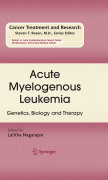
Acute myelogenous leukemia (AML), is the most common form of leukemia in adults. AML is a deadly form of malignancy, the prognosis for which has not improved in the last two decades. More importantly, it is a malignancy that is seen in older adults, therefore the number of cases is likely to rise as the population ages. Over the past 15 years, genetic mechanisms underlying AML have begun to unfold. Additional research in this area has helped identify key components and characteristics. Consequently, targeted therapy of AML is receiving much attention. It is the hope of researchers that as with chronic myelogenous leukemia (CML), and the drug, Gleevec, a targeted therapy for AML will be discovered. INDICE: The Leukemia Stem Cell.- Epigenetic Mechanisms in AML - a Target for Therapy.- Chromosomal Translocations in AML: Detection and Prognostic Significance.- Chromosomal Deletions in AML.- Genes Predictive of Outcome and NovelMolecular Classification Schemes in Adult Acute Myeloid Leukemia.- Receptor Tyrosine Kinase Alterations in AML – Biology and Therapy.- Lineage Specific Transcription Factor Aberrations in AML.- Pro-leukemic RUNX1 and CBFß Mutations in the Pathogenesis of Acute Leukemia.- Acute Myeloid Leukemia with Mutated Nucleophosmin (NPM1): Molecular, Pathological and Clinical Features.- MicroRNAs: New Players in AML Pathogenesis.- Murine Models of Human Acute Myeloid Leukemia.- AML and Apoptosis.- Acute Promyelocytic Leukemia, a Paradigm for Differentitation Therapy.- Immunotherapy of AML.- Therapy of Acute Myelogenous Leukemiain Adults.
- ISBN: 978-0-387-69257-9
- Editorial: Springer
- Encuadernacion: Cartoné
- Páginas: 342
- Fecha Publicación: 01/10/2009
- Nº Volúmenes: 1
- Idioma: Inglés
